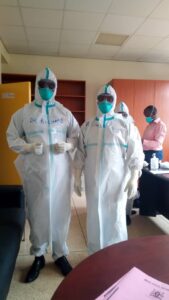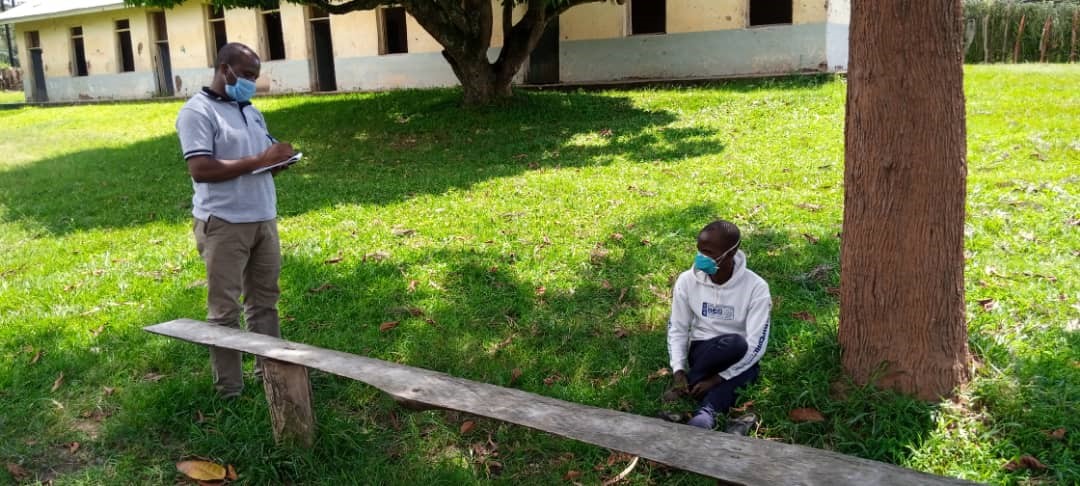
The role of PHFP Field Epidemiology Fellows in the response to the COVID-19 pandemic in Uganda, 2020
Quarterly Epidemiological Bulletin : April to June 2020 Volume 5 Issue 2 Article No. 3
Authors: Elizabeth Katana1, Alex Ndyabakira1, Steven N. Kabwana1, Lilian Bulage1, Alex R. Ario1, Julie Harris2
Affiliations;
1Uganda Public Health Fellowship Program, Ministry of Health, Kampala, Uganda
2US Centers for Disease Control and Prevention, Kampala, Uganda
Correspondence: ekatana@musph.ac.ug
The Uganda Public Health Fellowship Program (UPHFP), established in 2014 by the Ministry of Health (MoH) in partnership with Makerere University School of Public Health and the U.S. Centers for Disease Control and Prevention (CDC), aims to develop a competent public health workforce to manage epidemics and improve disease surveillance in Uganda. Fellows in this program, all of whom must enter with a Master’s Degree, typically spend 85% of their two years in MoH placements, providing service delivery directly relevant to MoH needs, gaining competencies in major public health domains as well as conducting outbreak investigations countrywide whenever the need arises. Since 2015, PHFP has graduated 40 fellows, and has 25 currently in training; 13 in their first year (cohort 2020), and 12 in their second year (cohort 2019).
Historically, PHFP has played a critical role in supporting the MoH in a wide range of activities. By 2018, fellows had investigated more than 91 outbreaks country wide. Some notable outbreak investigations included typhoid in 2015, yellow fever and meningitis in 2016, and multiple nationwide outbreaks of cholera, malaria, measles, and others (1). PHFP fellows today are valued members of the National Rapid Response Team of the National Task Force (NTF) for Public Health Emergencies.
In March 2020, the World Health Organization declared the novel coronavirus (COVID-19 disease, caused by the SARS-CoV-2 virus) a pandemic. By June 14, 2020, over 7 million people were reported to have been infected with COVID-19 across 213 countries globally, including 696 confirmed cases in Uganda. Since February 2020, all fellows, staff, and several alumni of UPHFP have been actively involved in the countrywide preparedness and response efforts for the COVID-19 pandemic in Uganda, working closely with the COVID-19 National Task Force. The COVID-19 National Task force is charged with establishment of a strong response system to be able to prevent, detect and respond to suspected cases of COVID-19 in collaboration with other relevant ministries, agencies and departments of Government and was formed in mid-January by the Ministry of Health at Public Health Emergencies Operations Center (PHEOC).
Before cases were recognized in Uganda, the MoH set up active surveillance and risk communications activities at the Entebbe International Airport, as this was the likeliest mechanism of COVID-19 introduction into Uganda. During January-March 2020, all twelve Cohort 2019 fellows conducted risk communication and assessment, screening, and active surveillance activities at the Entebbe International airport, ultimately enabling the detection of the first case in Uganda on March 21, 2020. These Fellows also closely monitored several high-risk travelers in areas of Entebbe and Kampala who were quarantining at their homes to ensure rapid identification and evacuation of any symptomatic COVID-19 suspects.
Many of the PHFP alumni drafted Standard Operating Procedures (SOPs) for contact tracing, which are still being used today. Contact tracing, which involves identifying contacts of cases and quarantining them, effectively breaks the chains of transmission of infectious diseases. Contact tracing is a key strategy for preventing further spread of an infectious disease during an outbreak.
Starting in March 2020, following the confirmation of the first COVID-19 case in Uganda, several alumni and fellows were officially deployed by the Public Health Emergency Operations Center (PHEOC) to be part of the COVID-19 National Task Force, activating district task forces, managing the COVID-19 national case database, overseeing proper data collection and entry, and harmonizing data from different sources such as laboratories, hospitals, and points of entry, among others.
With the increasing number of cases, the needs soon exceeded the capacity of the team, and it became necessary to train others in public health intervention activities, including contact tracing and surveillance. All twelve Cohort 2019 fellows were part of a team that drafted training materials and SOPs for enhanced surveillance and conducted Trainers of Trainers (TOTs) for enhanced surveillance for surveillance teams in all regions countrywide.
In mid-March, three PHFP Cohort 2020 fellows, Richard Migisha, Patricia Thiwe and Aggrey Byaruhanga, conducted Training of Trainers (TOTs) sessions for contact tracing and surveillance teams at the Emergency Operations Center. These TOTs enabled the team to multiply knowledge about contact tracing and surveillance, effectively increasing the capacity for response to COVID-19 many folds.
Beginning in March 2020, referral hospitals around the country began serving as isolation centers, caring for persons who tested positive and whose cases required investigation. Case investigation is an important component of public health efforts, enabling efficient management and support for patients during an epidemic response, and also supports the identification of exposed contacts, to stop the transmission chains. Two fellows (Richard Migisha and Ignatius Wadunde) and alumni Bernadette Mirembe Basuta have been part of the case investigation teams at isolation units of referral hospitals countrywide, conducting in-depth interviews with confirmed cases. Ultimately, these case investigations yielded high-quality information about relevant exposures for the cases, as well as providing information about the clinical picture of COVID-19 disease in Uganda. The findings and reports from these investigations have been used by MoH and stake holders to subsequently guide the response.

On May 1, 2020 Masindi District reported a confirmed case of COVID-19 in a police officer who was identified through a rapid and widespread community testing initiative. The police officer had interacted with more than 800 persons while he was ill. A team of four Cohort 2020 fellows (Josephine Namayanja, Immaculate Akusekera, Bob Omoda Amudan and Geoffrey Amanya) was dispatched to investigate and support Masindi district in the efforts to respond to the outbreak. These fellows established, functionalized, and supervised four institutional quarantine facilities in the district. Organized institutional quarantine is an important public health practice and a valuable way to control geographical spread of infectious disease outbreaks including COVID-19.
Another team of three Cohort 2020 fellows (Peter Oumo, Job Morukileng, and Daniel Emong) was tasked with similar activities in mid May 2020, in Kyotera District following an upsurge in confirmed cases of COVID-19 among truck drivers crossing at border points in Kyotera. This ensured that fellows were able to identify practical solutions that would fit the communities at hand while conducting field activities and also strengthen their skills in community engagement activities.

In mid-May 2020, with closure of the airport, the COVID-19 epidemic had shifted from imported cases in high risk travelers accessing the country by air to cases among persons crossing at land border points including truck drivers and their contacts as well as unauthorized travelers using porous borders. Human movements have been known to significantly contribute to the spread of infectious diseases outbreaks over the years. As a result, it was important to understand population movements at some of the Points of Entry, to gain a better understanding of where the highest risk might be. Four Cohort 2020 fellows (Alex Ndyabakira, Job Morukileng, Geoffrey Amanya, and Bob Omoda Amudan) were tasked with risk mapping and monitoring population movements of truck drivers and high-risk travelers at major Points of Entry of Ntungamo, Mirama Hills, and Tanzania, including several porous borders such as Kikagati and Buganga. These fellows also followed, documented, and mapped these transient populations in major town centers of Masaka District. Risk mapping and monitoring population movements enables understanding of the risks or threats that may arise from these key population movements that could impact negatively on the efforts to control an epidemic in public health responses.
Several alumni and fellows were deployed by Ministry of Health to serve as COVID-19 Epidemiologists at district levels. These have activated district response task forces, established active community surveillance and trained district contact tracing teams country wide. This has enabled capacity building and improved workforce in the country’s response to the COVID-19 epidemic. Fellows have also made presentations to the National Taskforce which has informed the implementation of non-pharmaceutical interventions to contain the pandemic in Uganda.
The participation of PHFP Fellows in various activities of the COVID-19 response has filled critical human resource gaps at the Ministry of Health and enabled the fellows to obtain competencies in applied epidemiology, public health leadership, communication as well as conducting surveillance. The fellows will continue to support the COVID-19 response in the coming months, as well as many other public health issues and outbreaks.
In summary PHFP fellows and graduates have contributed substantially in all core components of Uganda’s COVID-19 response and preparedness. Their contribution, training and service during COVID-19 will serve as a pillar for development of a workforce competent in real-time disease surveillance and response to Public Health Emergencies.
References
- Ario AR, Bulage L, Kadobera D, Kwesiga B, Kabwama SN, Tusiime P, et al. Uganda public health fellowship program’s contribution to building a resilient and sustainable public health system in Uganda. Glob Health Action. 2019 Dec 13;12(1):1609825.
Read and Download full Article below;

Comments are closed.